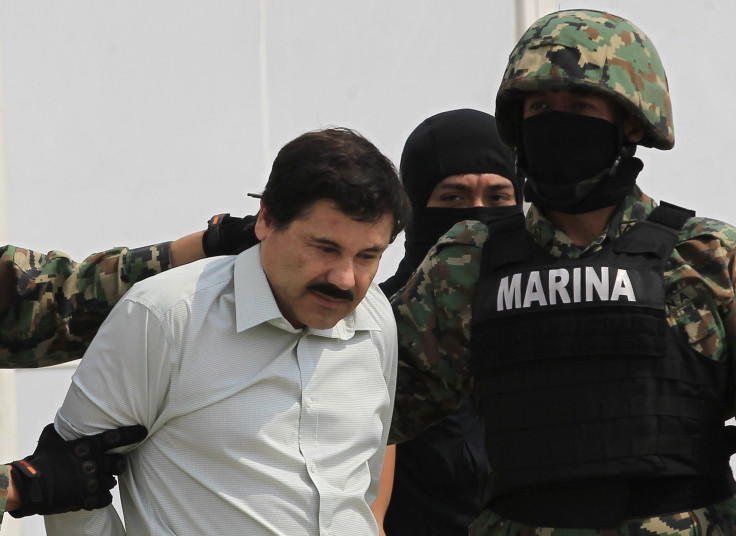Mexican And US Police Arrest World's Most Wanted Drug Lord Joaquín 'El Chapo' Guzman; Mexican Media And Officials Celebrate The End Of 'Mexico's Bin Laden'

MEXICO CITY -- When Osama Bin Laden was killed by U.S. commandos in 2011, Mexican drug lord Joaquín Guzmán Loera, known as "El Chapo" ("Shorty" in Spanish), inherited the title of most wanted criminal in the world. Leader of the Sinaloa Cartel and main operator of a drug trafficking network that spans three continents, Chapo managed most of Mexico’s drug market. He even scored a spot among Forbes’ richest men in the world.
Guzman's stellar criminal career was brought to a halt when a joint operation by Mexican and U.S. special forces arrested him Saturday, bringing a decade on the run to an end. Chapo, who was born in Badiraguato, in the northwestern state of Sinaloa, in 1957, was captured at 6:40 a.m. local time in a hotel in Mazatlán and taken to the country's top-security penal institution in Altiplano, in the state of Mexico.
Federal Attorney General Jesús Murillo Karam stated in a press conference that the operation had been in the works for several months and was carried out “impeccably.” Chapo was arrested without a single shot fired, along with 13 of his underlings.
Mexican leaders expressed their elation from the early hours of Saturday. “The whole of Mexico needs to celebrate this,” said Fausto Vallejo Figueroa, governor of Michoacán, a state plagued by drug wars.
“This is a great step further for Mexico,” said Soberón Sanz, head of the Mexican Navy.
The arrest is a big notch in the belt of President Enrique Peña Nieto, who promised in his inaugural address on Dec. 1, 2012, that it was his priority to free Mexico from the burden of drug trafficking.
Several members of his administration took to Twitter with messages of pride and celebration.
“This arrest demonstrates our commitment to ensure the safety and health of all Mexicans,” said Agriculture Minister José Carlos Ramírez Marín.
Ex-President Felipe Calderón Hinojosa, who made the war on drugs the center of his 2006-2012 term as the country’s leader, personally congratulated Peña Nieto on the achievement.
The leader of the ppposition party Partido Revolucionario Democrático (Party of the Democratic Revolution) said he hoped the arrest was not "just a mediatic-only operation."
"We hope this means crime will actually decline," said PRD leader Alejandro Sánchez Camacho.
International leaders also praised the operation. Colombian President Juan Manuel Santos phoned his Mexican counterpart for the “huge blow to drug trafficking that means the arrest of Chapo Guzmán,” as he wrote in his Twitter account. U.S. Attorney-General Eric Holder praised the “courage” of the Mexican special forces in the international operation and called the arrest a victory for both nations.
Mexican columnist Salvador Camarena is cautious in labeling the arrest as a triumph for Peña Nieto, but he does recognize it as a “ball of oxygen” to an administration that has been very praised in the international media, but still fails to gain the favor of his people: “This hit will put an end – at least for a good while – to all the doubts on the government’s efficacy in matter of security,” he wrote in Spanish newspaper El País.
“[The arrest] gives proof of ability, gives the President time, and renews trust that other goals can also be attained for Mexico,” he concluded.
However, as much as the arrest of El Chapo is a great blow to drug trafficking, it does not mean that the war on drugs is nearly over. According to former Mexican Attorney General Jorge Lara, the key to end cartels is to seize their property, not only to arrest their leaders.
“[Chapo] has built a huge fortune for himself – his real estate, works of art, jewels, cars… All of that needs to be taken away from Sinaloa if the cartel is to be truly minimized,” he said.
He also mentioned that there is no reason to believe an internal war will open in Sinaloa, as it was feared when the Zetas’ leader Miguel Treviño was arrested in July 2013 – it is pretty much clear that the management of Sinaloa will fall to Ismael “El Mayo” Zambada, who was already controlling several major operations within the cartel.
© Copyright IBTimes 2024. All rights reserved.











